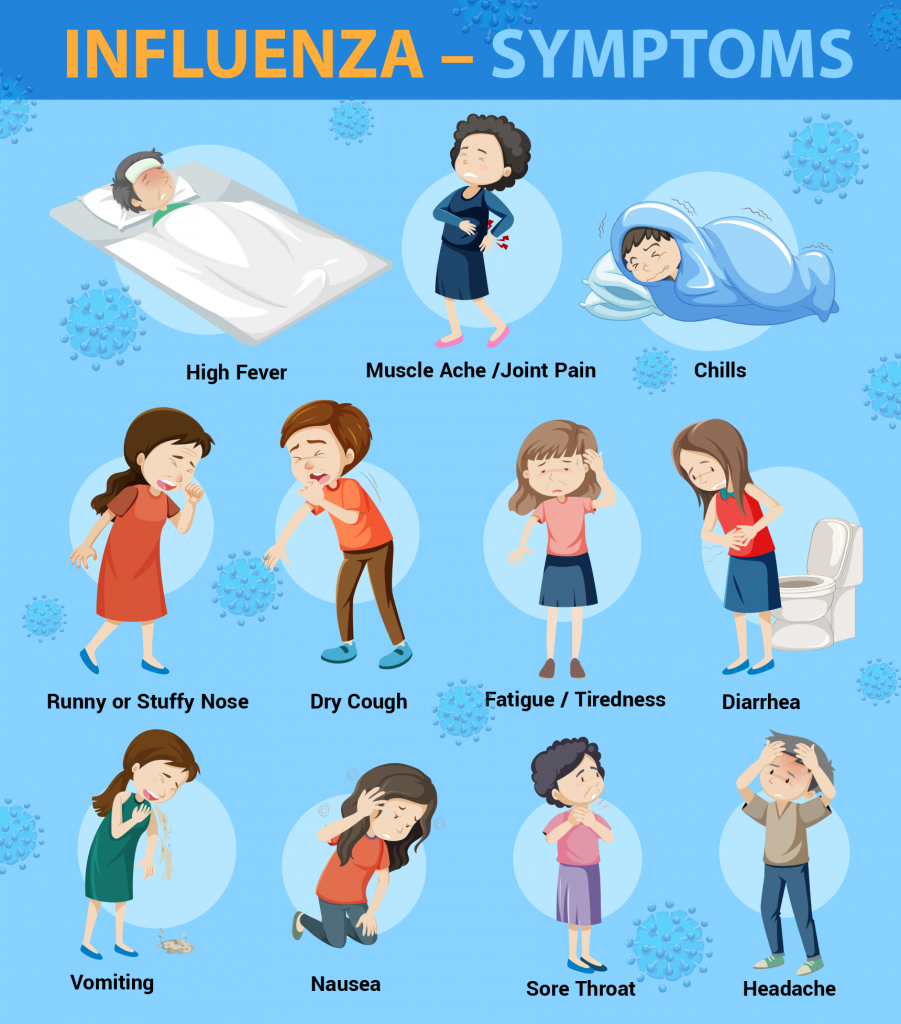- Lung Care Foundation
- 011 - 4225 2328
- lung@lcf.org.in
- Home
- About Us
- Our Initiatives
- Air Pollution
- Lung Basics
- Patient Support
- Get Involved
- Media
- Contact Us
Influenza
- Home
What is Influenza?
Influenza or flu is a highly contagious respiratory illness that is easily spread from person to person. It is caused by the influenza virus which can infect the nose, throat, and lungs. The viruses pass through the air and can enter your body through your nose or mouth. It can also be acquired from contaminated surfaces. It can cause mild to severe illness, but in some cases, it can become more serious leading to hospitalization or death.
People with a higher risk of developing influenza are:
- Elderly people (65 years and older)
- Infants
- Pregnant women
- People suffering from chronic health conditions such as asthma, heart disease, respiratory disease, kidney disease, and weak immune system, etc.
Causes
There are three different influenza virus families: A, B, and C.
- Influenza Type A viruses can infect people, as well as birds, pigs, horses, and other animals. There are different strains (or subtypes) of influenza type A viruses, two of which circulate among humans: H1N1 and H3N2.
- Influenza Type B viruses are usually found only in humans. Influenza B is associated with less severe infection than influenza A viruses.
- Influenza Type C viruses cause mild illness in humans. Influenza C cases occur much less frequently than A and B.
The viruses change constantly and different strains circulate the world every year.
How does it spread
- When the infected person coughs, sneeze or talk by inhaling the droplets that travel into the air.
- Touching the contaminated surface or object such as a keyboard, doorknob, etc and then touching your mouth, eyes, or nose without washing it.
Symptoms
Apart from cold which develops, the flu symptoms often appear suddenly and can include:
- Headache, muscle ache, and joint pain
- Dry cough
- Chills
- High fever
- Sore throat
- Runny or stuffy nose
- Fatigue (tiredness)
- Some people may suffer from nausea, vomiting, or diarrhoea but are more common in children than adults.
Diagnosis
Due to the non-specific nature of flu symptoms, it is difficult to tell if you have the flu based on symptoms alone. If you are at high risk for complications, a doctor’s exam may be needed to tell whether you have developed the flu or a complication of the flu. Some tests can determine if you have the flu as long as you are tested within the first 2 or 3 days of illness.
Treatment
Best ways to treat the flu are by:
- Staying at your home
- Getting adequate rest
- Staying hydrated
Antiviral Medicines
In case of serious complications, your doctor may prescribe you an antiviral medicine. Antivirals have been proven to reduce flu symptoms if started within a day or two of getting sick.
Treatment with antiviral medicine is most important for people with suspected or confirmed influenza who are at higher risk for complications.
Other Medications
Over-the-counter medication can be used to minimize discomfort associated with flu symptoms.
- Decongestant and antihistamine for congestion, cough and nasal discharge.
- Antibiotics may be prescribed if necessary to clear up a related sinus or ear infection.
Prevention
Get a flu vaccine every year
Make sure that you get your vaccination done as it is your best defence against the flu.
It is recommended mostly for the people who are at high risk.
Stop the spread of germs by practicing good health habits

- Wash your hands properly and often for 20 seconds. Don’t touch your eyes, mouth or nose if you have been in contact with flu germs as the most common way to catch the flu is through your hand.
- Stay at home and away from others if you are sick or they are sick. Don’t spread the flu.
- It is advised to always cover your mouth while coughing or sneezing
- The best method is to cover your mouth and nose with a tissue or your elbow when coughing or sneezing.
Questions for your Doctor
- What is the difference between cold and influenza?
- How do I know if I have got the flu?
- Should I get a test done?
- What are the emergency symptoms I should look for?
- Is it dangerous if one gets it?
- Any home remedies or herbal medicines?
Frequently Asked Questions (FAQs)
Seasonal influenza is a contagious respiratory disease caused by an influenza virus. It is not the same as a common cold. Influenza is characterized by a sudden onset of fever, cough (usually dry), headache, muscle and joint pain, severe malaise (feeling unwell), a sore throat and a runny nose. The cough can be severe and can last 2 or more weeks. Influenza cannot be treated with antibiotics. Severe cases of influenza may be treated by antiviral under the supervision of a doctor. The best protection against influenza is vaccination.
Most people recover from fever and other symptoms within a week without requiring medical attention. However, influenza can cause severe disease and death, especially in people over 65, young children, pregnant women and people with long-term health conditions. Every year, people in these at-risk groups die from influenza. Worldwide, up to 650 000 people die of respiratory diseases linked to seasonal influenza each year.
Influenza is always unpleasant regardless of the influenza virus type, but it is usually mild and most people recover quickly. People with symptoms such as coughing, sneezing, sore throat, headache and a slight temperature should rest at home; they can visit their local pharmacy for advice or use painkillers and decongestants.
People with severe or unusual symptoms and those at increased risk of severe disease (children under 5, people over 65, pregnant women and people with a pre-existing medical condition) should contact their physician to determine whether antiviral or other treatment is needed.
It is important to be vaccinated every year. This is partly because influenza viruses constantly change, meaning different strains can circulate each year, and partly because immunity from an influenza vaccination decreases over time. Seasonal influenza vaccines are updated each year to provide the highest possible protection by matching the circulating viruses.
At home also, patients should spit in a box which is covered by a lid. Before disposing off the sputum, it should be boiled. It is very important not to get scared or to hide the disease whenever someone develops the symptoms of TB. It is necessary that the person concerned may get himself/ herself examined and take adequate period.
No, influenza vaccines are safe and do not cause influenza. You might experience a reaction to the vaccination, but this reaction will not be influenza and will be milder than influenza symptoms. Even if you have been vaccinated, it is possible to get influenza. This is because the year’s vaccine is designed to protect against the season’s expected types of influenza, but not against every type of influenza. Furthermore, your individual immunity might make you more susceptible to a specific type of influenza. Nonetheless, vaccination is still recommended – even if you do get influenza, the symptoms will be milder and therefore less dangerous.
You’re contagious from the day before you develop symptoms until 24 hours after your fever breaks.
All Rights Reserved By LCF.ORG.IN | Privacy Policy | Terms and Conditions
Powered by: www.chillitrends.com
- Home
- About Us
- Our Initiatives
- Air Pollution
- Lung Basics
- Patient Support
- Get Involved
- Media
- Contact Us


